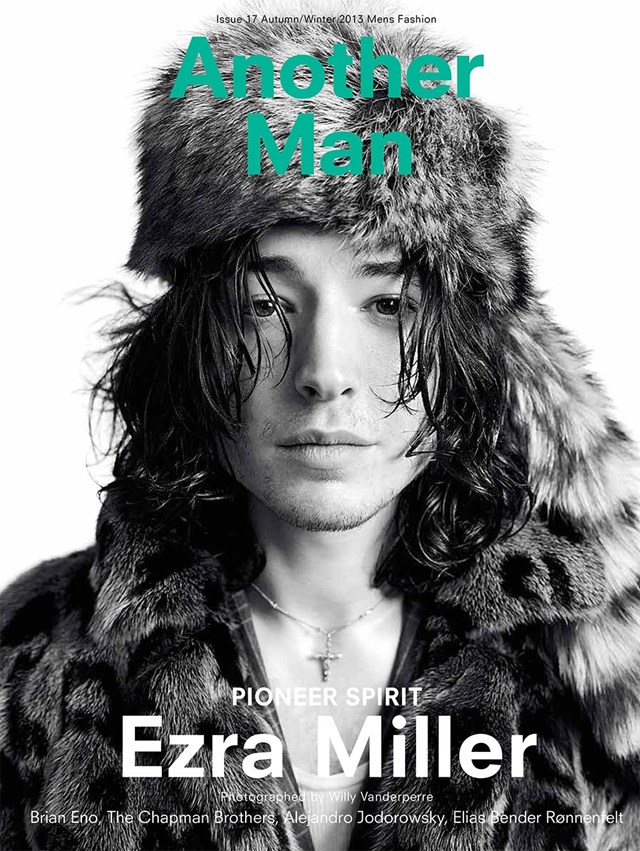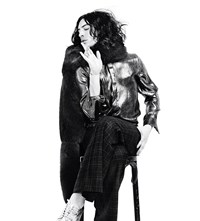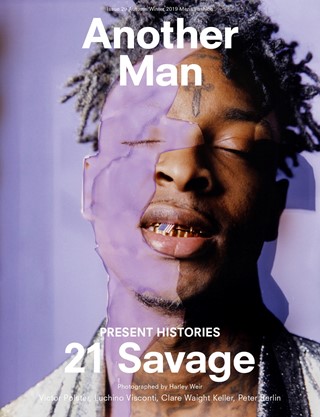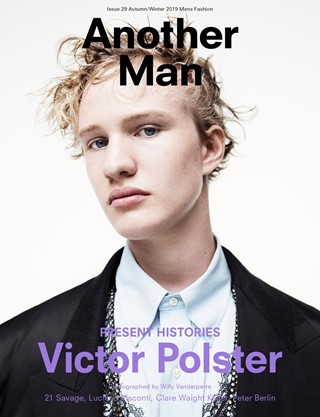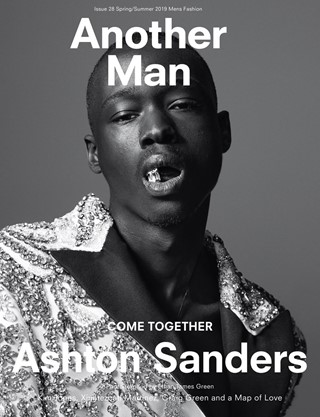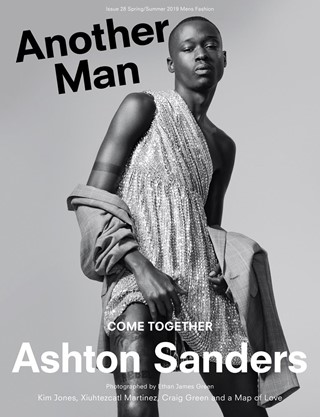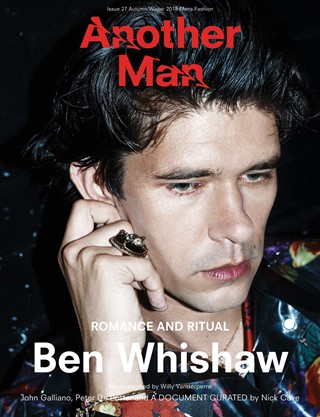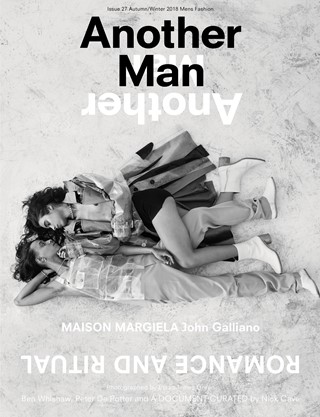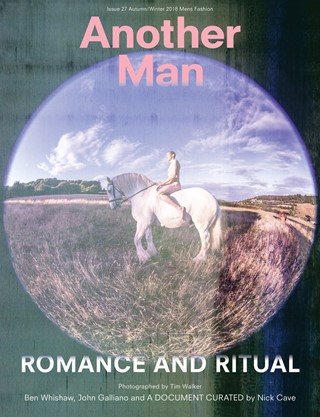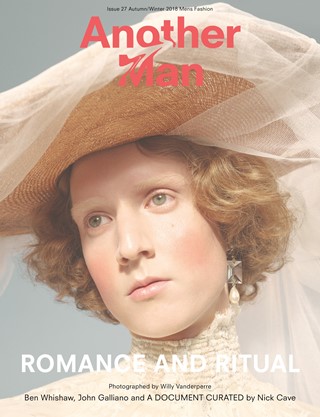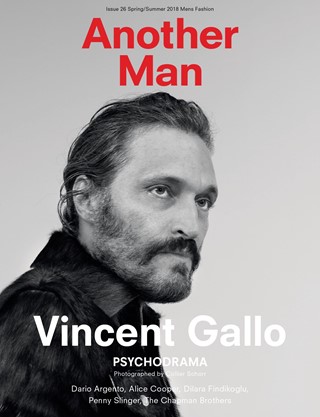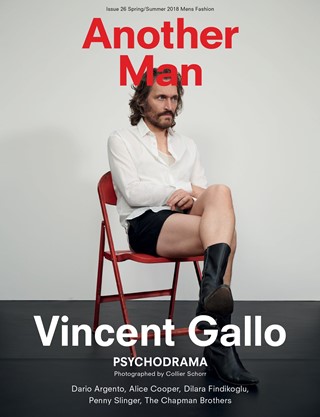Ezra Miller
I didn’t know who Ezra Miller is.
I’m a longstanding adult. I work a lot. I have urban movie-phobia. I see films on planes, in hotels or on pay-per-view, often long after their cultural crater forms. I don’t see many vampire or zombie movies. I forgot to read the Hollywood issue of Vanity Fair.
So when I was asked if I would do a cover story – I don’t do profiles because they entail public relations – on this actor who is sort of Justin Bieber’s generation and who I’d never heard of, it was such a weird request I had to take it seriously. So, I watched all of Ezra Miller’s films.
I watched him as a charmingly complicated loner chubby-chaser teen in the nice Andy Garcia ensemble film City Island, I watched the high school hit The Perks of Being a Wallflower in which he plays that very new creature, a charismatic and unapologetic out gay high school student hero, and then I watched the harrowing big family wedding tragicomedy Another Happy Day in which he effortlessly upstages Ellen Barkin, who acts her ass off, not to mention Ellen Burstyn, Demi Moore, Kate Bosworth, George Kennedy and a lot of other major actors. And then I watched We Need to Talk About Kevin in which he plays a teen so troubled it’s a family horror film and he artfully inflicts living hell on his mom, dad, school and town – a sort of Psycho meets Elephant with Tilda Swinton and John C. Reilly. Talk about range and intensity.
So then I said, “Yes please! I need to meet Ezra Miller.” He is a genius and maybe a big hope for great filmic art not to mention the continuation of civilisation and life on earth and stuff. Besides I haven’t met that many new geniuses of my generation lately. The hippies are getting hip transplants. At this point, if salvation doesn’t come from the youth, it ain’t coming.
And so I met probably the most interesting person I have met in years; no shit. And he’s 20, well 21 by the time you read this. And he dropped out of school at 16.
Ezra Miller is a fantastic, electric talent and comparing him to Brando or James Dean isn’t bullshit, if you’ve seen his films, he transforms himself into characters that are complex and compelling but I wasn’t prepared for his real life maturity, the depth of his understanding, his commitment to art in action, and his sheer indomitable spirit. He’s not just an actor; he is whatever he wants to be and feels he needs to be. His aliveness is all over the place, kind of Shakespearean, in a way. I’ve seen it in other great actors. He pays attention. He is right here. But he is also a remarkable autodidact. He knows shit way beyond his years.
I went to Brooklyn to visit him where he was staying with a friend – a beautiful, ethereal young woman who seemed about his age – in what David Johansen might have called a “bohemian love pad”. They had been making a painting, an interesting collaboration. The apartment was filled with books and musical instruments lay around, including Ezra’s drum kit.
Ezra is as striking in person as he is on screen. He’s tall and has shoulder-length hair which oddly has a little grey in it – as if physical proof of his uncanny wisdom – a wispy beard and a deep voice, which he’s had since his child parts, and which may give him part of his preternatural air of authority. He has dark intense brows and eyes but they light up, they widen as his interest rises. He has a hybrid look about him – is he part Spanish, part Mongolian, part American Indian? You might take him for older, but he still has traces of teenage complexion. He’s beautiful, but so intense a talker that you don’t really focus on it.
Ezra’s mom was a modern dancer, dad a big shot publisher. He was the plaything of his older sisters who dressed him like a girl for fun. He became an opera singer at six. And joined the Metropolitan Opera Children’s Chorus. He has worked with Robert Wilson, made his film debut at 16 in Afterschool, dropped out of school, did five episodes of Californication and Royal Pains on TV. You can tell that he does not hold all these parts equal, but he’s a pro and paying dues is paying dues.
He is a worker. He’s always working, thinking, talking, rolling cigarettes with tobacco, lavender and some other herbs, and talking non-stop with intensity and focus. He thinks while talking, not before or after, which is nice to encounter once in a while.
Ezra is in a band, called Sons of an Illustrious Father. They aren’t his band, he’s in the band, drumming and sometimes singing. He slyly describes their bag as “heavy meadow”. They were about to embark on a tour.
I won’t describe the music, I’ll just say, “see YouTube”. But this is a serious thing and a real collaboration that floats many promising boats. It’s not something you’ve heard before. It’s great to meet a band that belongs to a genre that doesn’t exist yet.
Actor and musician are two jobs Ezra does well, but I don’t think he limits himself to that. He says, “I’m acting right now.” Remember, this guy was a six-year-old opera singer. He does many other things like occupying Wall Street and reading Adbusters and making paintings all night. He did a dramatic reading for me of Banksy’s Coke ad in which he sort of does for Banksy’s manifesto what Bob Marley did for Selassie in “War”. He read the hell out of it. It made me want to take out a few billboards. Then for good measure he played me Saul Williams reading “Coded Language”. Maybe he’s a latter day Situationist, because he seems to have a good sense of going where he’s needed and where he can shine; also he’ll embark on a journey for the fun and/or hell of it.
In talking to him I felt like I also learned some very intriguing things about all the turn-of-the-millennium kids, the generation he represents so eloquently, even though I have a kid with a budding moustache of my own. This kid just skied to the North Pole, with a team of radical environmentalists for the purpose of dramatising the disappearance of sea ice, hence climate change. He looks at changing the world not as impossible, but as mandatory.
So I asked Ezra – only the second Ezra I’ve ever met (Pound kind of did an Adolf on it) – “Why are you on the cover of Another Man magazine?”
“I skied to the Arctic in April and planted a flag at the North Pole with this amazing team of international revolutionaries. Or maybe they want to talk about film, or the music I’m making.”
Okay, skiing to the North Pole?
“It came about through the work I’ve started to do with a friend of mine named Sol. We are both interested in storytelling in all of its manifestations. We’re dorks for it. And we think it’s both hilarious and potentially meaningful to tell little stories about inspiring things that are happening in the world, because it’s such a deficit. Joseph Campbell talks about how we’re an economy and a society based on aspiration, and inspiration is really the cure to our ailment.
“Sol’s older and he’s been doing this much longer than I have and he’s sort of taken me under his wing and showed me the ways of doing really stupid things for really smart reasons, such as skiing with a massive sled attached to your back across a frozen ocean to plant a flag four kilometres below your feet on the ocean floor.
“Team Aurora was incredible. I guess Sol must have thought that I had something to contribute to the team. There was a very specific reason for everyone to be there and we had a lot of different types of people. Nine out of the 16 of us had never been to the Arctic before, were not Arctic explorers, not people who engage in trekking. That’s a thing people do with their lives. We had a few people like that: a Russian woman named Luda Korobeshko who’d summited Everest twice and does the seven mountain thing every two years and our guide Eric Philips who is an Arctic trekker, and then Greenpeace actions people, some of them from Norway, some from Sweden and an indigenous woman from Northern Canada.
“These action guys from Norway really knew what they were doing. There was this guy Ulvar Arnkvaern who is an inspired activist. He climbs up on oil rigs and puts his body in the way, risks his life all the time. No big deal. He is Ulvar. He’s the wolfman. He would say things like, ‘Norwegians don’t feel the cold, they just turn blue and die.’ He would dip his gloves in the Arctic ocean and say, “You need a good ice layer… insulation.” He did all these things that were totally counterintuitive but that were the way – the true way – to survive in that inhospitable terrain.
“You can only do it in April. Before that it’s too cold to survive and after that, nowadays, there’s not enough ice to forge a straight path. It was 24 hours of sun a day. It was a symbolic struggle. We were there to plant a symbol.”
Did everything go as planned?
“Absolutely not. Nothing! This is the big warning. We had to hitch a ride from a helicopter. For a week we were adrift on a piece of ice. We were skiing but the piece of ice was drifting in the other direction as fast as we were skiing. It was like an icy treadmill. When you put your ski down you’re pulling the weight of this sled, which was between 80 and a 100 pounds. We should have just been carrying what we needed to survive, but we were also carrying banners, a generator so we could tweet from the North Pole, camera drones, a rig to lower a time capsule, a titanium flag to stand in opposition to the titanium flag that the Russians planted on the sea floor with a submarine. We’re like lazy Russians! Get on some skis.
“Two of our teams got Medevaced off the ice. Small teams with the proper amount of weight and they were trained. We were blissful the entire time. Every morning Kiera Dawn Kolson, who is a female drum bearer from the Northwest Territories, a really amazing person who works with Greenpeace, played her drum which survived better than all our equipment. Our sleds, which were designed for this trip, were breaking. We got beautiful shots from the camera drones but they broke in 40 seconds, froze in midair and dropped into the ocean.
“One of the symbolic acts the team planned was to send down a pod containing 2.7 million signatures on a statement. The sonic release button failed, so we couldn’t leave the pod on the ocean floor. We had to pull it back up and make a new system to drop it again.”
Ezra can get abstract, almost abstruse when describing why he does things like skiing to the North Pole. “You’re trying to affect what you’re putting into the machine to achieve a slight angular difference… The artist’s job has shrunk tremendously. Or has it grown? Not only do we have to focus on making our expression and doing our art but we also have to have a Martin Scorsese - like consciousness of the entire process.
“My friends and I talk about being the last generation ever to know a world without Internet. Just for a second, when we were kids. We have memories of that, but we’ve grown up with the technology and it puts a lot of people in my generation in a crazy position – working for the government or fighting against the government.”
I get it. I was a TV baby and the first thing I remember seeing on TV was a live atomic bomb test broadcast from Nevada. I learned to write on a typewriter and literally cut and paste.
Ezra continued: “My parents are always talking about The Wizard of Oz and what that meant for them. We don’t know that thing of ‘this is what there is to watch tonight.’ But that’s still one of my favourite movies.”
Ezra flipped out when I told him about a story I’d read on tornadoes in The New York Times science section – this was after tornadoes had devastated Oklahoma two weeks in a row, killing dozens, leaving thousands homeless. It seems that years ago a young writer that was researching tornadoes in the Midwest came across the story of a young girl who’d been killed by a tornado in Kansas, who was found face down in a puddle of water. Her name was Dorothy Gale. The writer’s name, of course, was L. Frank Baum who thereafter made Oz a place in all of our heads.
“Holy fuck!” he declared. “Holy fuck!”
I asked him about his next announced project, Madame Bovary, with Mia Wasikowska, Rhys Ifans and Paul Giametti. (Ezra is to be Leon, the lover.) He seemed excited about that project but also cinematically exploring past times in general.
“The thing about films is that until the moment they exist they really don’t exist. Bovary has been announced but it hasn’t been shot. There’s another potential period piece that’s really freaking me in. Percy Shelley. A personal favourite of mine. There’s a chance that film might come into existence, which could be great.” I can’t wait for Ezra Miller to hit the 19th Century. I think he’s going to shake things up a hundred years ago.
And he will continue to shake them up in the 21st. I talked a bit about how my generation – hippies and student radicals – had largely sold out, leaving a fervent minority, that I subscribe to, who are madly interested in weird youth.
“Kids are throwing rocks again and dropping acid. It really went quite dormant. It was effectively put to sleep.” And here he cites another famous distinguished friend and mentor. “Andy Stapp who wrote Up Against the Brass was a teacher of mine and a really valuable mentor. He says the problem was that so many movements converged in that time and space: black power, panthers, radical feminism, the Native American movement, the migrant workers. He talks about how there was a mistake made which was not to acknowledge the common ground of all of them, which was Wall Street. And that’s the reason that those movements were able to be broken up.” Ezra has a totally wise view of struggles. He sees that people were set up against each other. I concur. We talked a little bit about youth culture as a scam cooked up by marketeers like Edward Bernays and agreed on the importance of unity between smart people of all generations.
One of the most attractive things about Ezra is that he is open to attraction, literally, and in daring to do what few actors have done and in a kind of off the cuff way, he seems to be doing it more as a campaign against stereotyping sexuality than a declaration of passion or even orientation. His queer seems to be a sort of sexual un-orientation. Seems almost oriental.
Identifying himself as “queer,” he told Peter Travers, “it means that at this point in our world we’ve got a really confused idea of the way gender and sexuality works and we’ve created this really superfluous binary in the way we think about gender and I guess I identify as queer because I don’t identify with that. I think that makes us less whole. I don’t need to be assigned what I can do and who I can love. We keep drawing these battle lines that are completely unnecessary. That’s what I mean when I say I’m queer. I am saying that human beings are amazing and love is an honour and an opportunity and a fragile process in which there is no room for doubt and shame and hatred.”
Ezra – and whatever co-conspirators he might have – have taken what Gore Vidal said a few decades ago, “there are no homosexual people, only homosexual acts.”
On the subject of queer with The Advocate he put it maybe more metaphysically. “It’s generational in the way that that term is newly available in a certain way. I think it feels the most open and inclusive and that’s what makes it apply for me personally. I think there are a lot of people who fall on this open spectrum of sexuality. My friends and I use that word as an all-encompassing banner and for every human being. There should be an ongoing question and investigation of who you love and everything that’s involved with that very tricky and beautiful thing.”
Ezra is an artist survivalist. “There’s an art form to human survival. We need a really heightened art form of human survival. The creative survival methodologies we have to be coming up with in this time are immense. It’s an immense calling that we are not responding to. People are trying but other people are really standing in the way, and in a way that might be perilous. It might be game over for humanity, for things growing on this planet, or it might be the slap in the face wakeup call that we clearly have needed for a long time. It’s strange to feel a fork in the road for a planet and a species like that. There’s a Chinese curse: ‘May you live in interesting times’.”
When Ezra gets on a subject he really takes it on. It’s not a filibuster, but he knows his facts and he can spin them into an eloquent presentation. The following from Ezra isn’t a monologue – just a passage in a dialogue with long sections.
“Hurricane Sandy was caused by changes in the Arctic, what a shocker! 30 years with no Arctic ice in the summer. All the projections have turned out to be conservative. It’s a positive feedback loop. When Arctic ice melts it goes from this white surface that bounces 80% of sunlight back out to space and into this dark water that absorbs heat from sunlight. It’s only recently that we’ve honed in on the idea that climate change is anthropogenic. Now we know it definitely is, the majority of it. We are making a lot more carbon than volcanoes. Positive feedback loops. As the oceans heat, more carbon life forms create more carbon.
“What’s scary is when it stops being anthropogenic and we have just flipped the switch. The New York Times just announced that we’ve hit 400 ppm of carbon in the atmosphere, which we haven’t had in, what 500,000 years? The long feared number! We are not built for the type of changes that happened back then. We are so shocked to find that things are interconnected. ‘It’s a small world.’ No it isn’t. There are seven billion people on this planet. I’m a little haunted, I must confess. I went to the Arctic and I’m more haunted than before. Haunted is a weird word.
“The most haunting part is that we’re not living in an age of no hope. We are living in the age of choice, which is much scarier. It means that what we do every day matters, which is always a bummer for humans. But it’s a great thing and it’s inspirational and we need to remember that. We have a long way to go and not a long time to get there.”
Ezra is full of surprises. During the course of our conversation he was thrilled to hear that Allen Ginsberg and Ezra Pound – who might have had a role in his now rare first name (he also cites Ezra Cornell, founder of Western Union and Cornell University) – had an emotional meeting in which Pound asked forgiveness. He also quoted philosopher Martin Buber, which sounds great coming from a 20-year-old. He called Rudolf Steiner “one of the most important cats never discussed.” And he quoted Mark Twain: “Travel is the enemy of bigotry.”
Ezra not only makes up his own mind about everything, but he consults some formidable friends and he’s obviously given a lot of thought about what art means to him. “It’s just a gross high horse, the idea that artists make art,” he said. “I’m starting to find the idea that artists make art offensive.”
I hadn’t put it quite that way, but I was delighted to hear it come out of someone else’s mouth and not just from my Socratic demon. Actually, Ezra sometimes sounds exactly like my Socratic demon, he’s just better looking. How did Ezra sum himself up?
“I’ll tell ya, I’m a piece of work.”
A piece of great work! I don’t know about the future, and I don’t know if my generation will live to know which fork in the road we took, or if we did it in time, but I would really like the future to turn out the way Ezra Miller and his friends think it should. I love the idea of a future based on intellect and commitment, not on speculation.
